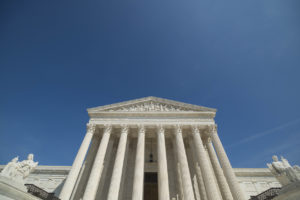Summary Background
In a term that seems to be touching upon the Federal Arbitration Act (the FAA) with unusual frequency, on January 15, 2019, the Supreme Court issued its second decision addressed to aspects of the FAA. In New Prime Inc. v. Oliveira, No. 17-340, the Court focused on the interpretation and application of section 1 of the FAA, which provides that the FAA does not apply “to contracts of employment or any other class of workers engaged in foreign or interstate commerce.” 9 U.S.C. § 1. The Court determined that independent-contractor truck drivers who drive interstate are covered by section 1 of the FAA and cannot be forced into arbitration by a court. Specifically, the Court addressed two issues: (1) whether it was the court or the arbitrator that must determine the applicability of section 1; and (2) whether section 1’s exemption for contracts of employment included, as a matter of law, independent contractor agreements.
Facts
Dominic Oliveira was an independent contractor (owner-operator) of New Prime Inc., an interstate trucking company (New Prime). The underlying agreement between Oliveira and New Prime specifically stated that there was no employer/employee relationship created between the parties. The agreement also contained a mandatory arbitration clause requiring all disputes be resolved through arbitration; the agreement further contained a delegation clause allowing the arbitrator to determine whether a particular dispute was subject to arbitration. Subsequent to entry into the agreement, a dispute over the rate of payment arose, and Oliveira joined in a class action under, inter alia, the Fair Labor Standards Act. Specifically, Oliveira claimed that New Prime treated its drivers like employees and had failed to pay them statutory minimum wages. New Prime sought to compel arbitration, and Oliveira opposed, contending that the FAA barred arbitration because it was a contract of employment under section 1.
The Arguments
New Prime argued in the first instance that in light of the agreement’s delegation clause, the question of section 1’s applicability was for the arbitrator to determine and not the courts. In contrast, Oliveira argued that this question was for the court to decide. Second, New Prime argued that the language in section 1 of the FAA concerning “contracts of employment” referred only to contracts involving an employer-employee relationship, not independent contractor agreements. In support of this argument, New Prime identified other statutes in which the ADR provisions governing employment-related disputes excluded independent contractor agreements. In response, Oliveira argued that whether he was viewed as an employee or an independent contractor did not matter; as a driver for New Prime he was a worker engaged in interstate commerce who was covered by the exceptions contained in the FAA. Oliveira pointed out that the FAA does not define the term “employment contract,” and that the plain meaning of this term should be utilized in rendering any determination; to that end, Oliveira pointed to language from other Supreme Court cases where the term “contracts of employment” was found to include independent contractor relationships.
On appeal, the U.S. Court of Appeals for the First Circuit upheld the district court’s decision that it was the court and not the arbitrator who should determine whether the FAA applies, and if the FAA does not apply, then the parties cannot confer authority to compel arbitration under the FAA simply by including a delegation clause in their underlying agreement. Oliveira v. New Prime, Inc., 857 F.3d 7, 15 (1st Cir. 2017). The First Circuit further held that although the FAA does not define the term “contract of employment,” at the time of the statute’s enactment, that definition would have included work by independent contractors; as such, the First Circuit found that the underlying agreement was undeniably a transportation worker’s agreement to perform work. Thus, section 1 of the FAA was applicable, which meant that the agreement was exempt from the FAA. New Prime appealed to the Supreme Court, and certiorari was granted to resolve a split in the circuits. In connection with the petition for certiorari to the Supreme Court, additional parties filed amicus briefs, such as the Customized Logistics and Delivery Association, the Chamber of Commerce, and the Society for Human Resource Management.
SCOTUS’s Decision
The Supreme Court unanimously held in favor of Oliveira (8-0, with Justice Kavanaugh recused[1]). The Court recognized that although courts have considerable authority under the FAA to compel arbitration, that authority is not unconditional in nature and does not extend to all private contracts, regardless of whether those contracts express a preference for arbitration. Writing for the Court, Justice Neil Gorsuch rendered the decision by initially considering the order in which the sections of the FAA are sequenced. The Court agreed with the First Circuit’s conclusion that the court must first look to whether the exemption contained within section 1 of the FAA applied before a court could then consider exercising the power to compel arbitration set forth in subsequent sections of the FAA (sections 3 and 4). The Court found that sections 1 and 2 limited the scope of the Court’s powers under sections 3 and 4 to stay litigation and compel arbitration. The Court noted that it historically has recognized the significance of a statute’s sequencing (citing Bernhardt v. Polygraphic Co. of America, 350 U.S. 198, 201–02 (1956); Southland Corp. v. Keating, 465 U.S. 1, 10–11, n.5 (1984)). The Court held that if the FAA does not apply at all pursuant to the provisions of section 1, then the Court need not reach the issue of delegation of arbitrability contained in later sections.
The Court held that it is a court, and not an arbitrator, that should determine whether the exclusion contained in section 1 applies before it can compel arbitration.[2] New Prime had argued that Oliveira had not specifically challenged the delegation clause, but rather whether the matter should be arbitrated and, thus, under the “severability principle” (wherein the validity of the delegation clauses is different than the validity of the agreement to arbitrate), contended that the entire controversy should proceed to arbitration.
However, the Court rejected this argument because it ignored the sequencing analysis set forth above, slip. op. at 6 (citing Prima Paint Corp. v. Flood & Conklin Mfg. Co., 388 U.S. 395, 402 (1967), explaining that “before invoking the severability principle, a court should ‘determine[] that the contract in question is within the coverage of the Arbitration Act.’”). Moreover, the Court held that the existence of the delegation clause in Oliveira’s agreement with New Prime did not alter this analysis because a delegation clause is “merely a specialized type of arbitration agreement,” and the FAA applies to the clause as well as any other arbitration agreement. As such, the existence of the delegation clause does not override the restrictions imposed by section 1 of the FAA. Returning to the sequencing argument, the Court held that a court may only use sections 3 and 4 to enforce a delegation clause if the agreement in the first instance does not trigger section 1’s exception.
Given the conclusion that section 1 of the FAA defines section 2’s terms, and makes it clear that the FAA did not apply to “contracts of employment . . . engaged in foreign or interstate commerce,” slip op. at 5, the Court next turned to address the second question: what the term “contracts of employment” means, and whether it includes independent contractor agreements. The Court noted that for purposes of the appeal, the parties had agreed that Oliveira qualified as a “worker [] engaged in . . . interstate commerce” and that the underlying contract established only an independent contractor relationship.
The Court first pointed to a “‘fundamental canon of statutory construction’ that words generally should be ‘interpreted as taking their ordinary . . . meaning . . . at the time Congress enacted the statute.’” Slip op. at 6 (quoting Wisconsin Central Ltd. v. United States, 585 U.S. __, __ (2018)). The Court noted that this canon exists to avoid reinterpreting statutes based upon new meanings, thereby “upsetting reliance interests in the settled meaning of a statute.” Slip. Op. at 7. The Court examined numerous historical sources, dictionaries, treatises, and cases and concluded that in 1925 (when the FAA was adopted), the ordinary meaning and usage of the terms “workers” and “contracts of employment” extended to a wide variety of employment relationships, including what today is referred to as independent contractors. Slip op. at 10. In fact, the Court noted that back in 1925, the term was not defined at all; thus, the Court concluded that it was not a term of art (as it is today). Rather, at the time of the statute’s enactment, the term contracts of employment broadly meant an agreement to work. (It should be noted that at the time of the enactment of the FAA Congress had already prescribed alternative employment disputes mechanisms for transportation workers, which is why the exclusionary language was implemented. See Circuit City Stores, Inc. v. Adams, 532 U.S. 105, 121 (2001)).
The Court also looked to the text in question as well as the surrounding text in the statute and identified that in other sections of the FAA Congress did not use the words “employees” or “servants,” but rather the word “workers.” Slip. op. at 9. The Court concluded that by using the term “workers,” which clearly would encompass an independent contractor, it was clear that Congress intended a broad meaning to be ascribed. Slip. op. at 10.
The Court also rejected New Prime’s attempt to rely upon the policy underlying the enactment of the FAA, which was an effort to balance and counter judicial hostility to arbitration. Although New Prime argued that at minimum this policy required the Court to compel arbitration as per the terms of the parties’ agreement, the Court found that this generalized policy goal would not allow it to ride rampant over the statutory text. Slip. op. at 14.
Thus, the Court held that based upon the plain language of the key terms, the ordinary meaning afforded to the key terms, as well as the intent of the drafters of the FAA, it was clear that the section 1 exemption contained in the FAA applied, and as such the Court affirmed the First Circuit’s conclusion that the lower court lacked the authority under the FAA to compel arbitration in the instant case. Justice Ruth Bader Ginsburg filed a concurring opinion, noting that Congress could also “design legislation to govern changing times and circumstances” and expressing a concern that rigorous adherence to the meaning of the text at the time of its enactment often might thwart rather than execute congressional intent.
The Impact of New Prime
This decision adds uncertainty to the application and enforceability of arbitration agreements in the transportation industry. Although the decision makes clear that independent contractors engaged in foreign or interstate commerce in the transportation industry are covered by the FAA’s section 1 exclusion, it does not address intrastate transportation jobs. For purposes of this case, the parties agreed that Oliveira was engaged in interstate commerce; therefore, workers engaged in intrastate transportation industry jobs are not necessarily covered by this decision. In the past, in order to fit within the FAA exceptions, attorneys have argued that even intrastate jobs are actually interstate in nature because they have a direct or substantial connection to interstate commerce.
Additionally, there is a question as to whether this decision will influence pending class-action litigations in other respects, such as those litigations pending against Grubhub and Doordash as well as other app-based platforms, many of which classify drivers as independent contractors. Of course, these companies must establish that the work being performed by their drivers is interstate in nature, not just intrastate. These companies are currently fighting wage-theft claims by requiring workers to sign arbitration agreements. Although the Court did not expressly determine whether courts would have the inherent power to enforce arbitration agreements under a different authority, such as state law as opposed to the FAA, many state statutes do not have similar exceptions for transportation workers; if there is no similar exception, then the end result may still be the enforcement of the arbitration of those disputes, albeit under state law. However, even assuming that a company could then compel arbitration under applicable state arbitration laws, as opposed to the FAA, an analysis of the pros and cons of doing so under each particular state’s law would be required because there is unfortunately a lack of uniformity across the states, so query whether a company would want to do so in every instance.
Within the trucking industry, the New Prime decision will have a major impact on a labor battle that has gone on for years, particularly in Southern California. Trucking firms will not be able to prevent workers from filing class-action lawsuits to address minimum-wage claims or other labor-law issues. The International Brotherhood of Teamsters has for years litigated issues concerning the misclassification of workers as employees versus independent contractors because the latter are not subject to certain statutes covering issues such as minimum wage, overtime, discrimination, sexual harassment, wrongful termination, and workplace injuries; these kinds of misclassification lawsuits have expanded into other industries as well, such as the construction and building service industries. The New Prime decision excluding the use of the FAA will allow the cost of resolving these disputes to continue to rise (which was the concern addressed in some of the amicus briefs initially filed). In an effort to keep disputes private, companies over the years have built into their agreements mandatory arbitration provisions. Although historically the Supreme Court has sided more often with businesses on arbitration matters, New Prime is a shift in that trend.
One thing is clear: despite the fact that the recent trend of decisions by the Supreme Court appears to support the enforcement of arbitration agreements, drafters should consider the implications of these decisions in the preparation of agreements. Companies should consider reviewing their mandatory arbitration clauses with independent contractors because they may no longer enforceable. Companies should also consider adding broad severability clauses in their arbitration agreements so that any class-/collective-action waiver provisions could remain enforceable even if the claims must be litigated in court.
[1] Justice Kavanaugh joined the Court on October 9, 2018, after this case was argued.
[2] It is important to note that in the Court’s recent decision in Henry Schein, Inc. v. Archer & White Sales, Inc., No. 17-1272 (Jan. 8, 2019), the Court held that it was the arbitrator who should resolve the issue of arbitrability; these decisions are not inconsistent because here the question before the Court is the determination and application of the FAA, which is a question that comes before that of arbitrability.











